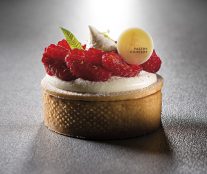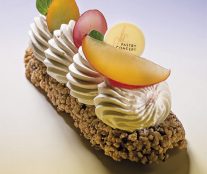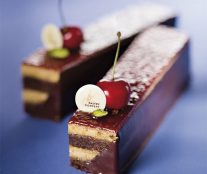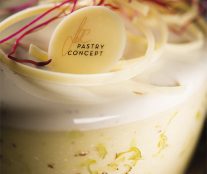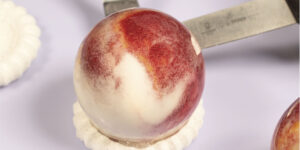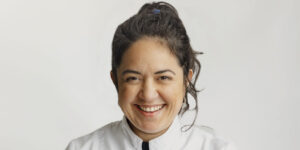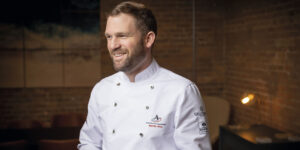Categories Pastry Chef Articles
Leonardo di Carlo: “Now chefs are the new stars”

A year and a half ago, Leonardo di Carlo packed his bags to found his own school and continue to nurture his formative vocation, but now from his own home base. After 23 years touring the world, the time had come to open a new phase, which has a name and last name, Pastry Concept, and is located in Treviso (Italy). His experience and professional maturity are a treasure of incalculable value to his students, who are advised to not waste time and encourage them to seek their own style. In this sense, in the following interview, Di Carlo leaves us pearls of wisdom like this: ‘What I don’t like about current pastry is the lack of identity. If you take a tour of social networks, you see all kinds of creations copied and replicated, a huge amount of glazed and soulless cakes.’
What is Leonardo di Carlo working on now?
For a year and a half, I’ve been involved in my pastry school, Pastry Concept, where together with my wife we organized a tight schedule of courses and private consulting. After 23 years of traveling the world as a lecturer and technician in schools and international companies of the sector, I decided to create my own space, where to continue the search for knowledge and share it with those who aspire to learn and acquire the necessary tools for this profession.
I am also working with Agora WEB on a program called Pastry Skill, a web application designed specifically for professional pastry, which will allow to introduce basic recipes and finished products with images and diagrams; schedule daily or weekly work; print labels about calories, nutritional values, energy…; see composition and costs of each product; share recipes, opinions, experiences with other users in a section that will be like a pastry community…
What are the courses that you give like?
They are very unique compared to other schools. We start with the basics, starting with ingredients to achieve balance in recipes. Another peculiarity is that they are only for a maximum of 6 students.
I am very proud of the science courses, in which each ingredient and the different pastry families are explored.
We also offer a consulting service tailored to the needs of the client, as well as all types of training for companies.
“The chefs have not understood that our goal is to delight the palate of our customers and make them feel good”
What is the most positive and the most negative aspect of pastry today?
Let’s start with the positive, and when I think of the positive, I believe in the future of our profession and in young people. Compared to when I was young, there is now availability of schools, and much more training, so if someone really wants to learn, you have many more possibilities. You always have to choose a good teacher, because it is not enough to be a good professional to teach others, you need other requirements such as empathy, know how to transmit or be generous when it comes to teaching.
What I don’t like about current pastry is the lack of identity. If you take a tour of social networks, you see all kinds of creations copied and replicated, a huge amount of glazed and soulless cakes.
Is the pastry chef closer to the chef in terms of social prestige or are they still distant?
Now chefs, cooks, pastry chefs are the new stars. Maybe they don’t understand that our goal is to delight the palate of our customers and make them feel good with our creations. We must be careful with this phenomenon of being in the spotlight, to avoid the domino effect.
“It is not enough to be a good professional to teach others, you need other requirements such as empathy, know how to transmit or be generous”
Should the pastry chef think about what is healthy or is obtaining maximum pleasure non-negotiable?
Of course we are responsible for what we do, and we must have a professional ethic to create sweets with a healthy vision. Reducing saturated fats in products and reducing sugars is a crucial step.
How does one obtain their own style in pastry? How is this learned?
First you need to have high self-esteem and be convinced that the product created is what we really want. Trying to create your own style and impose it on the market is a way of showing our identity.
All this cannot be transmitted, but can be shared to help each company grow.
What is the first thing you tell your students that begin in the trade?
Do not waste your time, it’s too precious and in the end it takes a toll on you. In a recent consultancy, I set an example: If a boy uses 2 hours a day in social networks or wastes time on other things, at the end of the year it will be 720 hours (30 24-hour days). Do you know how many things can be done, such as research, testing or training courses? This explains who succeeds and who doesn’t reach their goal.
After your excellent book, ‘Tradition in Evolution’, are you thinking of a second book?
To be honest, we have already edited a second book on the occasion of the first anniversary of our school, entitled ‘Buona la prima’. It is a collection of original recipes created by me with some students, which also includes technical concepts for professionals and for gourmands. All the proceeds from this project are donated to charities for the needy.
But my first book ‘Tradition in Evolution’ will have a continuity in an idea in which I have been thinking about for years. It will be a book that does not exist, outside the usual schemes and above all with ingenious solutions.
You will find this four recipes in so good #18
